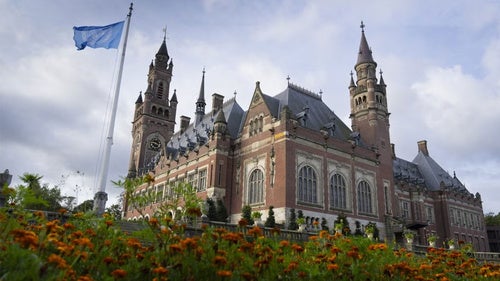What is the International Court of Justice, Where Israel Faces Genocide Charges?

On Dec. 29, South Africa brought genocide charges against Israel in the International Court of Justice. Israel said it will defend itself from the charges at hearings on Jan. 11 and 12 in The Hague.
In short: On Dec. 29, South Africa brought genocide charges against Israel in the International Court of Justice. Israel said it will defend itself from the charges at hearings on Jan. 11 and 12 in The Hague. South Africa has asked the court to order an immediate suspension of Israeli military operations in the Gaza Strip while the case proceeds through the ICJ, which could take years. Any ICJ orders would be legally binding for Israel and South Africa, although countries have ignored ICJ court orders in the past.
What is the International Court of Justice?
The ICJ was established as part of the inception of the U.N., in 1945. It is considered the main judicial body of the U.N.
The ICJ consists of a 15-judge panel that handles disputes between countries and provides advice to U.N. agencies. Judges are elected by the U.N. General Assembly and Security Council and serve nine-year terms.
Countries taking part in an ICJ case can also add an “ad hoc” judge of their nationality if there isn’t already one on the bench. For example, in South Africa’s case against Israel, the ICJ didn’t have a South African or Israeli judge already on the bench, so each country got to choose an ad hoc judge. That means a 17-judge panel will be evaluating South Africa’s case against Israel.
Between May 1947 and November 2023, the court heard 191 cases, including four contentious cases involving the same international genocide law that South Africa cites in its charges against Israel. The most recent case involving genocide accusations was in 2022 related to Russia's invasion of Ukraine.
Contentious ICJ cases – those between countries rather than one party asking for legal advice – include each side filing written statements with the points they plan to make and the laws they’re relying on. Then each side delivers an oral argument to the court. The judges then make their decision privately. The court can make interim orders, called provisional measures, at any time during the process, which remain in effect while the case is being considered. On Jan. 11 and 12, the court will hear arguments on whether South Africa’s suggested provisional measures, including the suspension of Israeli military operations in Gaza, will be put in place during the case.
A decision on the provisional measures could take the court weeks to deliver. In a 1993 case between Bosnia and Serbia, the ICJ took 19 days to rule on provisional measures. The Global Centre for the Responsibility to Protect considered this a quick turnaround.
What power does the ICJ have?
While ICJ decisions are legally binding and cannot be appealed, the ICJ only maintains authority over U.N. members or nations that accept its authority through some other mechanism, like a clause in a treaty. Since South Africa and Israel are both U.N. members, any decision would, in theory, be binding.
But multiple countries have ignored ICJ decisions. In 2022, Russia ignored a court order to stop invading Ukraine. The U.S. has ignored at least two ICJ orders, the first, in 1986, when the ICJ ruled that U.S. support for the right-wing Nicaraguan rebels, the contras, was illegal, and the second, in 2018, when the court demanded the U.S. make exceptions in its sanctions on Iran.
In 2004, the ICJ issued a nonbinding advisory opinion stating that Israel’s building of a wall in and around East Jerusalem was against international law, which Israel ignored.
What is South Africa’s genocide case against Israel and how has Israel responded?
According to South Africa’s application to the ICJ asking it to hear the case, Israel is in breach of a 1948 United Nations convention that defines and outlines genocide as a crime.
On Oct. 7, Hamas launched an attack against Israel, killing about 1,200 Israelis and taking more than 200 hostages. In response, Israel launched a “complete siege” on Gaza, which included cutting off its access to food and electricity, and waging “the deadliest and most destructive” military campaign in recent history, the Associated Press reported.
South Africa says Israel’s actions are “genocidal in character” because they are “intended to bring about the destruction” of Palestinians in the Gaza Strip. Among its evidence, South Africa includes the death toll of over 21,000 Palestinians and widespread food insecurity across Gaza. It’s estimated that between Dec. 8, 2023, and Feb. 7, 2024, all of Gaza’s 2.2 million residents will be considered in “crisis or worse” by the Integrated Food Security Phase Classification, a scale used by governments and international organizations to analyze food insecurity.
In response to South Africa’s case, Israel’s government spokesperson said the country would appear before the ICJ to fight the accusations of genocide. He further said the case was missing “both a factual and legal basis.”
South Africa has been a vocal critic of Israel’s role in the Israel-Hamas war. In October, it called for a cease-fire and for Israel to be held accountable for the deaths of non-combatants in Gaza.
In November, South Africa’s legislature voted to close its Israeli embassy and cut diplomatic ties with the country until a cease-fire was agreed upon.
South Africa and the Palestinian territories have a decades-long relationship, starting with Palestinian solidarity during South African apartheid. Nelson Mandela, a leader of the African National Congress, the anti-apartheid movement that is now the ruling party in South Africa, expressed solidarity with the Palestine Liberation Organization in 1990.
“We identify with the PLO because just like ourselves, they are fighting for the right of self-determination,” Mandela said.
What’s next?
After the ICJ decides on provisional measures, the case will begin with oral arguments. There is no definitive timeline for when a decision will be made. The most recent resolved case involving genocide charges took 14 years.

